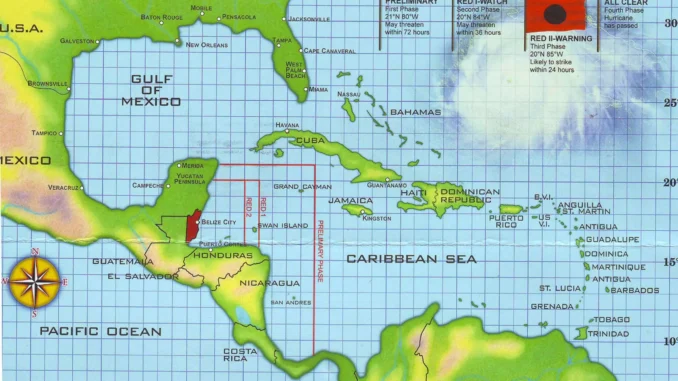
Belize is a dream destination for many—turquoise waters, world-class diving, lush rainforests, and a relaxed, Caribbean vibe that makes it feel like time slows down. Whether you’re planning a vacation, scouting for investment property, or thinking about making Belize your new home, one question tends to come up sooner or later:
How often do hurricanes affect Belize?
It’s a valid concern, and understanding the reality of hurricane season in Belize can help you plan smarter, travel safer, and invest with confidence.
🌀 So, How Often Do Hurricanes Hit Belize?
Belize lies in the western Caribbean, a region that’s active during the Atlantic hurricane season—June 1 through November 30. However, the country doesn’t get hit nearly as often as some might think.
- On average, Belize experiences a direct hurricane hit every 6 to 8 years.
- Tropical storms, which are less intense than hurricanes but still capable of causing damage, affect Belize every 2 to 3 years.
- The peak months for storm activity are August, September, and October.
Even when a hurricane doesn’t make landfall in Belize, nearby systems can still bring heavy rainfall, flooding, and rough seas—especially in coastal areas and the cayes (like Ambergris Caye or Caye Caulker).
📚 A Quick Look at Belize’s Storm History
Some of the most notable hurricanes to hit Belize include:
- Hurricane Hattie (1961): A devastating Category 5 storm that destroyed much of Belize City. The damage was so extensive, it led to moving the capital inland to Belmopan.
- Hurricane Iris (2001): Struck southern Belize as a Category 4, damaging homes and wildlife habitats.
- Hurricane Earl (2016): A relatively mild Category 1, but still caused significant wind and flood damage around Belize City and the cayes.
While direct hits are rare, these events highlight the importance of preparedness—especially for property owners and residents.
🏡 What Does This Mean for Real Estate Investors?
If you’re considering buying property in Belize—whether for a vacation home, rental investment, or full-time residence—storm risk is something to factor in, but it’s far from a deal-breaker.
Here’s what savvy buyers do:
- Build or buy inland or on elevated land to minimize flood risk.
- Choose properties with storm-resistant features like concrete construction, hurricane shutters, and reinforced roofs.
- Look into property insurance that covers storm damage—it’s widely available in Belize.
- Make sure your home or investment has a solid property management plan, especially if you’re not living there full-time.
Many expats and investors find that with the right precautions, Belize remains a sound—and beautiful—place to put down roots or build a portfolio.
✈️ What About Travelers?
If you’re planning a trip to Belize during hurricane season, don’t panic. The vast majority of trips go off without a hitch—even in peak months.
To play it safe:
- Consider travel insurance that covers trip cancellations due to weather.
- Monitor weather forecasts before and during your trip (especially if traveling in late summer or fall).
- Stay in touch with your hotel or tour provider—most have emergency plans and are well-prepared for any tropical weather events.
Many seasoned travelers actually prefer the off-season, when there are fewer crowds, better prices, and lush green landscapes from the rains.
🌴 The Bottom Line
Yes, Belize is located in a hurricane-prone region, but direct hits are relatively rare, and the country has solid infrastructure and experience in handling storms. Whether you’re visiting for a week or investing for a lifetime, understanding the risks—and planning ahead—makes all the difference.
With smart decisions and a little weather awareness, you can enjoy all the beauty, adventure, and opportunity Belize has to offer, year-round.


Great write-up, I am regular visitor of one¦s web site, maintain up the nice operate, and It is going to be a regular visitor for a lengthy time.
Appreciate that.
he blog was how do i say it… relevant, finally something that helped me. Thanks
Thanks for your support..
I’ve read some good stuff here. Definitely worth bookmarking for revisiting. I wonder how much effort you put to create such a great informative web site.
Yes a lot of time and effort here.
Absolutely composed content material, Really enjoyed looking at.
I always was interested in this topic and stock still am, thankyou for posting.
Enjoyed reading through this, very good stuff, thankyou. “Management is nothing more than motivating other people.” by Lee Iacocca.
Somebody necessarily lend a hand to make seriously posts I’d state. This is the very first time I frequented your website page and so far? I amazed with the research you made to create this particular submit incredible. Magnificent process!
I love your writing style truly enjoying this internet site.
Appreciate the insight